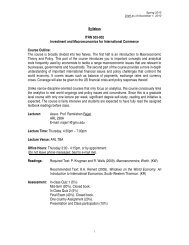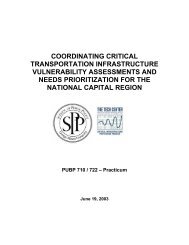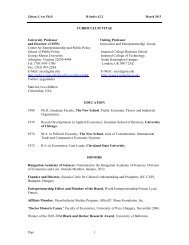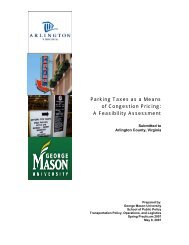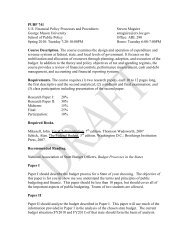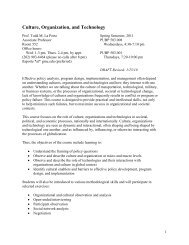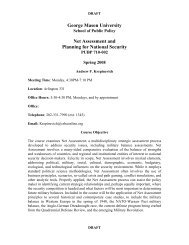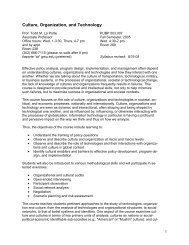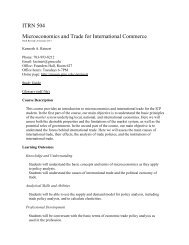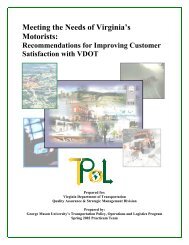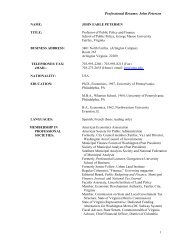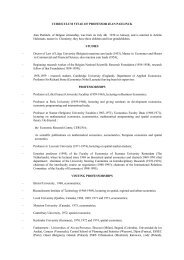PUBP 710-B04 - George Mason University
PUBP 710-B04 - George Mason University
PUBP 710-B04 - George Mason University
Create successful ePaper yourself
Turn your PDF publications into a flip-book with our unique Google optimized e-Paper software.
DRAFT SYLLABUS <br />
Leadership in a diverse world<br />
<strong>PUBP</strong> ELECTIVE Summer 2008<br />
GEORGE MASON UNIVERSITY<br />
Professor: Jessica Heineman-Pieper, PhD<br />
jhpieper@gmu.edu<br />
Office: Arlington Campus, Original Building, Room 249<br />
Office hours: Wednesdays, 2-3 & by appointment<br />
Telephone: 703-993-2272<br />
Class Location: Arlington, Room TBD<br />
Mondays and Wednesdays, 4:30-7:10pm, June 2 July 16, 2008<br />
OVERVIEW<br />
<strong>PUBP</strong> <strong>710</strong>-<strong>B04</strong>; Syllabus<br />
Heineman-Pieper, Summer 2008<br />
In our globalizing world, leaders especially policy makers find themselves in complex<br />
environments. Their work often requires that they engage across realities and perspectives for<br />
which at first they may feel they have little or no comprehension or common ground. Often, the<br />
realities we can see are dwarfed by the realities we don't see. Through a variety of case<br />
studies, participants will learn core competencies for effective leadership, engaged dialogue,<br />
and conflict resolution in a diverse and dynamically unfolding world.<br />
These complexities require not just knowledge and . Participants will<br />
have the opportunity to reflect on and explore who they are and who they choose to be, both<br />
within themselves and within the world. Likewise, participants will develop their understanding<br />
of how different people might experience and view the same reality differently, and will also<br />
<br />
well and meaningfully. We will also consider what might be required in connecting across these<br />
sorts of differences. The course will be organized around ways in which we might see and<br />
understand (inner and outer) leadership in diverse contexts, while at the same time this focus on<br />
leadership will itself be examined critically in light of how a leadership focus orients our thinking<br />
and what it might lead us either to emphasize or to ignore. The course encourages each of us<br />
<br />
(submerged and explicit) commitments and stances, and to engage powerfully with our own and<br />
<br />
LEARNING PROCESS<br />
According to John Haugeland, we can only have authentic knowledge to the extent that<br />
ts such as science.<br />
own responsibility<br />
not <br />
, p. 173). In the same vein, -create a<br />
learning environment that supports each person, as well as all of us together as a group, in<br />
for our own learning, rather than replicating <br />
command/control systems in the conduct of the classroom.<br />
At an individual level, this means that you can design your own education, with my<br />
assignments as recommendations subject to three requirements. First, if you would like to<br />
modify an assignment or readings, please stay in meaningful communication and dialogue with<br />
1
<strong>PUBP</strong> <strong>710</strong>-<strong>B04</strong>; Syllabus<br />
Heineman-Pieper, Summer 2008<br />
me (sufficiently ahead of the due dates). Second, I request that your choices and their<br />
outpourings be out of positive commitment; if you find yourself in apathy or complacency, please<br />
communicate this to me so both of us can learn and grow from it. Third, as you make your<br />
choices, please <br />
to avoid or close down (for example, please do explore some areas and perspectives that you<br />
would not normally engage).<br />
<br />
generative learning environment (and we can also collectively choose our collective guiding<br />
principles). If you see s spend our time<br />
together not because we have to but because we truly <br />
class (so to speak), and all take responsibility for turning on some music. To adapt<br />
There is no teacher in this class (or rather, <br />
learners, leaders and followers). And as we all <br />
standing in a genuine appreciation and respect for, and affiliation with, each and every person<br />
and her/his journey.<br />
IMPORTANT INFORMATION (readings) ON READINGS:<br />
You have the freedom of, and thus the responsibility for, your own education in this<br />
course. None of the readings is absolutely required. You can decide to exchange<br />
readings I recommend for some you think would benefit you more. You can decide how<br />
and/or passionately<br />
connect with creative other sorts of experiences you feel will better support you in<br />
inhabiting and being who you positively and most authentically choose to be. You are<br />
free and responsible to decide all of these questions. I only require that where you<br />
choose alternative paths you include me in your deliberations and considerations (in<br />
advance) in a viva voce conversation (ideally in person but it can be by phone; and<br />
please send me follow up email detailing what we discussed).<br />
Below, I list up to three categories of readings. First are listed the ones that are<br />
recommended<br />
<br />
references are included as FYIs in case at some point you have time and inclination to<br />
pursue them. The 2 nd two categories are not always present (and the third can be<br />
present without the second).<br />
Sometimes the assigned reading lists look long because there are lots of short articles.<br />
Sometimes they look short but are in fact long. Especially in the latter case, take charge<br />
of your education. You might choose to get a real sample of things and jump around, or<br />
go deeply into some aspects, or both. Put your heart and soul into exploring what YOU<br />
most want to experience and learn from the course.<br />
To access e-reserves, go to http://furbo.gmu.edu/cgi-bin/ers/OSCRgen.cgi and the<br />
Course # is <strong>PUBP</strong> <strong>710</strong> <strong>B04</strong>. My last name is alphabetized under H (Heineman-<br />
Pieper). The password is xxxxx. E-reserves will be activated for summer term a couple<br />
of weeks before term starts.<br />
READINGS (See Important Information on Readings, above)<br />
2
Books (feel free to purchase any editions/used):<br />
<strong>PUBP</strong> <strong>710</strong>-<strong>B04</strong>; Syllabus<br />
Heineman-Pieper, Summer 2008<br />
Danaher, Kevin (Ed.) (1994). Fifty Years is Enough: The Case against the World Bank and the<br />
International Monetary Fund. Boston, MA: South End Press.<br />
Farmer, Paul. (2004). Pathologies of Power. Berkeley, CA: <strong>University</strong> of California Press. (you<br />
may opt to read only one chapter, though I think you may find it valuable to have the book<br />
and read more of it, so you can choose whether or not to buy <br />
need).<br />
Frankl, Viktor. (1984) New York: Simon & Schuster.<br />
Osho. (2004) Joy: The happiness that comes from within. <br />
(Note on reading Osho: read this as an experience, for what it may possibly<br />
open up for you, rather than reading for content or facts or to agree/disagree.)<br />
Perkins, John. (2004). Confessions of an economic hit man. Plume.<br />
Wise, Tim. (2008). White Like Me: Reflections on Race from a Privileged Son. Brooklyn, NY:<br />
Soft Skull Press.<br />
Articles to purchase from Harvard Business Review:<br />
Argyris, Chris. (1991). Teaching smart people how to learn. Harvard Business Review. May-<br />
June, pp. 99-109.<br />
Collins, Jim. (2001). Level 5 leadership. Harvard Business Review. January, 79(1).<br />
Kellerman, Barbara. (2004). Leadership warts and all. Harvard Business Review, January, 40-45.<br />
To purchase at discounted class price, please visit the following link:<br />
http://harvardbusinessonline.hbsp.harvard.edu/relay.jhtml?name=cp&c=c62148<br />
Movie to watch on your own (we can organize a screening if people would like)<br />
Citizen King (PBS)available at the Lincoln Memorial (in the bookstore), and presumably on<br />
the PBS website; also on reserve in Arlington Library.<br />
Articles and book chapters:<br />
Argyris, Chris. (1991). Teaching smart people how to learn. Harvard Business Review. May-<br />
June, pp. 99-109. [for sale via Harvard Business Review online]<br />
Argyris, Chris. (1976). Leadership, learning and changing the status quo. Organizational<br />
Dynamics. Winter, Vol. 4(3), pp. 29-43. <br />
e-reserve; please access this via e-journals, and ask the librarians if you have difficulty]<br />
<br />
-Chai & John A. Bargh<br />
(Eds.) The Use and Abuse of Power: Multiple Perspectives on the Causes of Corruption.<br />
New York: The Psychology Press. 41-56.<br />
Bligh, Michelle C. & Meindl, James R. (2004). The cultural ecology of leadership: An analysis of<br />
popular leadership books. In David M. Messick & Roderick M. Kramer (Eds). The<br />
Psychology of Leadership: New Perspectives and Research. Lawrence Erlbaum. 11-52.<br />
[this is an ebook you can read this online when you find it through the GMU library; ask<br />
the librarians to help you if you have difficulties]<br />
Chen, Emmeline S. & Tyler, Tom R. (2001). Cloaking Power: Legitimizing Myths and the<br />
Psychology of the Advantaged. In Annette Y. Lee-Chai & John A. Bargh (Eds.) The Use<br />
and Abuse of Power: Multiple Perspectives on the Causes of Corruption. New York: The<br />
Psychology Press, 241-262.<br />
Collins, Jim. (2001). Level 5 leadership. Harvard Business Review. January, 79(1). [for sale via<br />
Harvard Business Review online]<br />
Farmer, Paul. (2004). Pathologies of Power. Berkeley, CA: <strong>University</strong> of California Press.<br />
NOTE: Please read first chapter and as much as you have time and interest in after that<br />
3
<strong>PUBP</strong> <strong>710</strong>-<strong>B04</strong>; Syllabus<br />
Heineman-Pieper, Summer 2008<br />
<br />
Fisher, Peter. (1972). Famine, affluence and morality. Philosophy and public affairs. Vol. 1, No. 3,<br />
Spring, pp. 229-243.<br />
Fiske, Susan T. (2001). Effects of Power on Bias: Power Explains and Maintains Individual,<br />
Group and Societal Disparities. In Annette Y. Lee-Chai & John A. Bargh (Eds.) The Use<br />
and Abuse of Power: Multiple Perspectives on the Causes of Corruption. New York: The<br />
Psychology Press, 181-194.<br />
Illich, Ivan. (1992). Needs. In Wolfgang Sachs (Ed.) The Development Dictionary. London: Zed<br />
Books, 88-101.<br />
The<br />
Groupthink SyndromeGroupthink: Psychological Studies of Policy Decisions and<br />
Fiascoes. Boston, MA: Houghton Mifflin Co., 2-14; 174-5; 193-4. Feel free to dip into one<br />
or more of the case studies if you wish.<br />
Ki-Zerbo, Joseph et al. (1997). Education as an instrument of cultural defoliation: A multi-voice<br />
report. In Rahnema & Bawtree (Eds.). The Post-Development Reader. London: Zed<br />
Books. Pp. 152-160.<br />
King, Martin Luther, Jr. (1986). Suffering and faith. In James M. Washington (Ed.) A testament of<br />
hope: The essential writings and speeches of Martin Luther King, Jr. New York: Harper<br />
Collins, pp. 41-42.<br />
King, Martin Luther, Jr. (1986). Eulogy for the martyred children. In James M. Washington (Ed.) A<br />
testament of hope: The essential writings and speeches of Martin Luther King, Jr. New<br />
York: Harper Collins, pp. 221-223.<br />
King, Martin Luther, Jr. (1986). Love, Law and Civil Disobedience. In James M. Washington (Ed.)<br />
A testament of hope: The essential writings and speeches of Martin Luther King, Jr. New<br />
York: Harper Collins, pp. 43-53.<br />
King, Martin Luther, Jr. (1986) The power of non-violence. In James M. Washington (Ed.) A<br />
testament of hope: The essential writings and speeches of Martin Luther King, Jr. New<br />
York: Harper Collins, pp. 12-15.<br />
King, Martin Luther, Jr. (1986). Pilgrimage to nonviolence. In James M. Washington (Ed.) A<br />
testament of hope: The essential writings and speeches of Martin Luther King, Jr. New<br />
York: Harper Collins, pp. 35-40.<br />
King, Martin Luther, Jr. (1986). An experiment in love. In James M. Washington (Ed.) A testament<br />
of hope: The essential writings and speeches of Martin Luther King, Jr. New York: Harper<br />
Collins, pp. 16-20.<br />
<br />
Margaret J. Wheatley on life-Journal of Management Inquiry, Vol. 14,<br />
No.1, March, pp. 71-77.<br />
Mahoney, Martha R. (1997). The social construction of whiteness. In Richard Delgado and Jean<br />
Stefancic (Eds.). Critical white studies: Looking behind the mirror. Philadelphia:<br />
Temple <strong>University</strong> Press. 330-333.<br />
<br />
syndrome. Journal of Management Inquiry, Vol. 11, No.3, September, pp. 282-292.<br />
Ogoni Movement report: http://www.ratical.org/corporations/OgoniFactS.html<br />
Osho (2008). Preface. From Meetings with Remarkable People. London: Watkins Publishing, pp.<br />
ix-xii.<br />
Prahallad, C.K. (2206). The innovation sandbox. Strategy+business, Issue 44, pp. 62-71. Available<br />
on-line at: http://www.strategy-business.com/press/freearticle/06306<br />
Sachs, Wolfgang (Ed.) The Development Dictionary. London: Zed Books. Please read the<br />
<br />
Sachs, Wolfgang. The need for the home perspective. In In Majid Rahnema & Victoria Bawtree<br />
(Eds.) The Post-Development Reader. London: Zed Books. pp. 290-301<br />
4
<strong>PUBP</strong> <strong>710</strong>-<strong>B04</strong>; Syllabus<br />
Heineman-Pieper, Summer 2008<br />
Saro-Wiwa, Ken. Selected writings at:<br />
http://www.ratical.org/corporations/KSWletter.html<br />
http://www.ratical.org/corporations/KSWstmt.html<br />
I will email or hand out in class a few poems from Dance the Guns to Silence.<br />
Schumacher, E.F. (1973). Small is beautiful: Economics as if people mattered. New York: Harper.<br />
<br />
-66 & 13-41.<br />
Senge, Peter M. (2005). Missing the boat on leadership. Leader to leader. (Fall). pp. 28-30.<br />
Tutu, Nontombi. (2003) Foreword. In Winbush, Raymond A. (Ed.) Should America Pay? Slavery<br />
and the raging debate on reparations. New York: Amistad. xv xix.<br />
White, Judith A. (1998). Leadership through compassion and understanding: An interview with<br />
Aung San Suu Kyi. Journal of management inquiry. Vol. 7, No. 4, 286-293.<br />
Wildman, Stephanie M. & Davis, Adrienne D. (1997). Making Systems of Privilege Visible. In<br />
Richard Delgado and Jean Stefancic (Eds.). Critical white studies: Looking behind the<br />
mirror. Philadelphia: Temple <strong>University</strong> Press. 314-319.<br />
Recommended Books:<br />
Baggott, Andy. (2005). Living the Zen Arts. New York: Sterling Publishing. (especially pp. 1-27<br />
& 44-91, which is most of the book. You can get for about $6 at Half Price Bookstores).<br />
Baker, Ann C.; Jensen, Patricia J. & Kolb, David A. (2002). Conversational Learning: An<br />
Experiential Approach to Knowledge Creation. Westport, CT: Quorum Books.<br />
Block. Peter. (2002). The Answer to How is Yes. San Francisco: Berrett-Koehler Publishers.<br />
Hart, Paul T. (1994). Groupthink in Government: A Study of Small Groups and Policy Failure.<br />
Baltimore, MD: Johns Hopkins <strong>University</strong> Press<br />
Heifetz, Ronald A. (1994). Leadership Without Easy Answers. Cambridge, MA: Harvard<br />
<strong>University</strong> Press.<br />
King, Martin Luther, Jr. (2000). . New York: Signet Classics.<br />
King, Martin Luther, Jr. (2001). The Autobiography of Martin Luther King, Jr. Clayborne Carson<br />
(Ed.). New York: Warner Books.<br />
Lee-Chai, Annette Y. & John A. Bargh (Eds.) (2001). The Use and Abuse of Power: Multiple<br />
Perspectives on the Causes of Corruption. Philadelphia, PA: Psychology Press. (a few<br />
<br />
book)<br />
Mills, Charles W. (1997). The Racial Contract. Ithaca, NY: Cornell <strong>University</strong> Press.<br />
Rahnema, Majid & Bawtree, Victoria (Eds.) (1997). The Post-Development Reader. London:<br />
Zed Books. (there will be several chapters assigned or recommended from here and whole<br />
book is good, so if you wanted to get the book you can, though not required)<br />
Sachs, Wolfgang (1992) The Development Dictionary. London: Zed Books. (4 chapters<br />
assigned or recommended but whole book is good. Not required, though may be hard to<br />
get all of the chapters without buying the book).<br />
Schumacher, E.F. (1973). Small is beautiful: Economics as if people mattered. New York:<br />
Harper.<br />
Washington, James M. (Ed.) A Testament of Hope: The Essential Writings and Speeches of<br />
Martin Luther King, Jr. New York: Harper Collins, pp. 16-20. (several short pieces are<br />
assigned and will be available on e-reserve, but you may choose to read the whole book)<br />
Recommended articles/book chapters<br />
Baker, Ann C.; Jensen, Patricia J. & Kolb, David A. (2002). Conversational Learning: An<br />
Experiential Approach to Knowledge Creation. Westport, CT: Quorum Books, pp. 15-19<br />
and 101-108.<br />
5
<strong>PUBP</strong> <strong>710</strong>-<strong>B04</strong>; Syllabus<br />
Heineman-Pieper, Summer 2008<br />
<br />
Power. In Annette Y. Lee-Chai & John A. Bargh (Eds.) The Use and Abuse of Power:<br />
Multiple Perspectives on the Causes of Corruption. New York: The Psychology Press,<br />
263-280.<br />
and<br />
andGroupthink in<br />
Government: A Study of Small Groups and Policy Failure. Baltimore, MD: Johns Hopkins<br />
<strong>University</strong> Press, pp. 3-23; 139-159; 161-179.<br />
Illich, Ivan & Rahnema, Majid. (1997). Twenty six years later: Ivan Illich in conversation with Majid<br />
Rahnema. In Majid Rahenema & Victoria Bawtree, The Post-Development Reader.<br />
London: Zed Books. 103-110.<br />
Kellerman, Barbara. (2004). Leadership warts and all. Harvard Business Review, January, 40-45.<br />
Kidder, Tracy. (2003). Mountains beyond mountains: Healing the world, the quest of Dr. Paul<br />
Farmer, a man who would cure the world. New York: Random House. Chapter 1, pp. 1-<br />
44.<br />
Kofman, Fred & Senge, Peter M. (1993). Communities of commitment: The heart of the<br />
learning organization. Organizational Dynamics. 22(2), 4-23. <br />
allowed to put this on e-reserve; please access this via e-journals, and ask the librarians<br />
if you have difficulty]<br />
Miller, Danny & Le Breton-Miller, Isabelle. (2007). Kicking the habit: Broadening our horizons<br />
by studying family businesses. Journal of Management Inquiry. 16(1) March. 27-30.<br />
Parameshwar, Sangeeta (2006). Inventing the higher purpose through suffering: The<br />
transformation of the transformational leader. The Leadership Quarterly. 17, 454-474.<br />
Pieper, Martha H. and Pieper, William J. (2003). Addicted to unhappiness: Free yourself from<br />
moods and behaviors that undermine work, relationships and the life you want. New York:<br />
McGraw Hill. Excerpts: pp. 12- 43, 93-102.<br />
Pratto, Felicia & Walker, Angela (2001). Dominance in Disguise: Power, Benificence, and<br />
Exploitation in Personal Relationships. In Annette Y. Lee-Chai & John A. Bargh (Eds.) The<br />
Use and Abuse of Power: Multiple Perspectives on the Causes of Corruption. New York:<br />
The Psychology Press, 93-114.<br />
Sahlins, Marshall. (1997). The original affluent society. In Majid Rahnema & Victoria Bawtree<br />
(Eds.) The Post-Development Reader. London: Zed Books. pp. 3-21<br />
(Assignments are listed following the week-by-week schedule of topics and readings)<br />
6
<strong>PUBP</strong> <strong>710</strong>-<strong>B04</strong>; Syllabus<br />
Heineman-Pieper, Summer 2008<br />
CLASS SESSIONS, TOPICS, READINGS and ASSIGNMENT DUE DATES<br />
Readings are listed under the class periods for which they should be completed.<br />
Asterisks (*) indicate the readings that are most highly recommended.<br />
Readings are listed roughly in order of recommendation, though feel free to follow your<br />
interests. Please see Important Information on Readings, above.<br />
Monday, June 2, 2008<br />
<br />
*Ki-Zerbo, Joseph et al. (1997). Education as an instrument of cultural defoliation: A multi-voice<br />
report. In Rahnema & Bawtree (Eds.). The Post-Development Reader. London: Zed<br />
Books. Pp. 152-160.<br />
Corporate leadership and leadership in corporations<br />
*Bligh, Michelle C. & Meindl, James R. (2004). The cultural ecology of leadership: An analysis of<br />
popular leadership books. In David M. Messick & Roderick M. Kramer (Eds). The<br />
Psychology of Leadership: New Perspectives and Research. Lawrence Erlbaum. 11-52.<br />
[this is an ebook you can read this online when you find it through the GMU library; ask<br />
the librarians to help you if you have difficulties]<br />
Collins, Jim. (2001). Level 5 leadership. Harvard Business Review. January, 79(1).<br />
*Wildman, Stephanie M. & Davis, Adrienne D. (1997). Making Systems of Privilege Visible. In<br />
Richard Delgado and Jean Stefancic (Eds.). Critical white studies: Looking behind the<br />
mirror. Philadelphia: Temple <strong>University</strong> Press. 314-319.<br />
*Mahoney, Martha R. (1997). The social construction of whiteness. In Richard Delgado and<br />
Jean Stefancic (Eds.). Critical white studies: Looking behind the mirror. Philadelphia:<br />
Temple <strong>University</strong> Press. 330-333.<br />
Prahallad, C.K. (2206). The innovation sandbox. Strategy+business, Issue 44, pp. 62-71. Available<br />
on-line at: http://www.strategy-business.com/press/freearticle/06306<br />
Senge, Peter M. (2005). Missing the boat on leadership. Leader to leader. (Fall). pp. 28-30.<br />
Recommended:<br />
Miller, Danny & Le Breton-Miller, Isabelle. (2007). Kicking the habit: Broadening our horizons by<br />
studying family businesses. Journal of Management Inquiry. 16(1) March. 27-30.<br />
Kellerman, Barbara. (2004). Leadership warts and all. Harvard Business Review, January, 40-45.<br />
Ehrenreich, Barbara. (2001). Nickel and Dimed: On (Not) Getting By in America. New York:<br />
Henry Holt & Co. (Esp. Intro and Chapter 1)<br />
FYI: For further reading if you wish at some point<br />
Yukl, Gary. (1989). Managerial leadership: A review of theory and research. Journal of<br />
Management. 15(2), 251-289.<br />
Senge, Peter. (1990<br />
and Practice of the Learning Organization, pp. 339-362. Doubleday. New York.<br />
Khurana, Rakesh. (2002). The curse of the superstar CEO. Harvard Business Review. September,<br />
60-66.<br />
Wednesday, June 4, 2008<br />
Groups, organizations, and leadership challenges in practice<br />
*Argyris, Chris. (1991). Teaching smart people how to learn. Harvard Business Review. May-<br />
June, pp. 99-109.<br />
7
<strong>PUBP</strong> <strong>710</strong>-<strong>B04</strong>; Syllabus<br />
Heineman-Pieper, Summer 2008<br />
*Argyris, Chris. (1976). Leadership, learning and changing the status quo. Organizational<br />
Dynamics. Winter, Vol. 4(3), pp. 29-43.<br />
<br />
Margaret J. Wheatley on life-Journal of Management Inquiry, Vol. 14,<br />
No.1, March, pp. 71-77.<br />
<br />
syndrome. Journal of Management Inquiry, Vol. 11, No.3, September, pp. 282-292.<br />
The<br />
Groupthink SyndromeGroupthink: Psychological Studies of Policy Decisions and<br />
Fiascoes. Boston, MA: Houghton Mifflin Co., 2-14; 174-5; 193-4. Feel free to dip into one<br />
or more of the case studies if you wish. See also a <br />
principles at http://www.susangerke.com/200504.pdf<br />
The Fog of War (Section on the Cuban Missile Crisis):<br />
http://youtube.com/watch?v=6IhPS9tuG4c ]<br />
Recommended:<br />
Kofman, Fred & Senge, Peter M. (1993). Communities of commitment: The heart of the learning<br />
organization. Organizational Dynamics. 22(2), 4-23. [located on e-journals]<br />
and<br />
andGroupthink in<br />
Government: A Study of Small Groups and Policy Failure. Baltimore, MD: Johns Hopkins<br />
<strong>University</strong> Press, pp. 3-23; 139-159; 161-179.<br />
For further reading if you wish at some point<br />
Bennis, Warren, G. & Thomas, Robert, J. (2002). Crucibles of leadership. Harvard Business<br />
Review. September, pp. 39-45<br />
Thomas, Robert. (2008). Chapter 2: Extracting insight from Experience. Crucibles of Leadership:<br />
How to learn from experience to become a great leader. Cambridge, MA: Harvard<br />
Business School Press. pp. 17-42.<br />
Monday, June 9, 2008<br />
Personal Leadership:<br />
*Osho. (2004) Joy: The happiness that comes from within. New York: St. A<br />
NOTE ON READING OSHO: Try reading for what possibilities it might open up for you,<br />
rather than either for content or to agree/disagree. Osho offers to wake us up: There is<br />
<br />
Osho (2008). Preface. From Meetings with Remarkable People. London: Watkins Publishing, pp.<br />
ix-xii.<br />
Recommended:<br />
Baggott, Andy. (2005). Living the Zen Arts. New York: Sterling Publishing. pp. 1-27 & 44-91.<br />
Pieper, Martha H. and Pieper, William J. (2003). Addicted to unhappiness: Free yourself from<br />
moods and behaviors that undermine work, relationships and the life you want. New York:<br />
McGraw Hill. Excerpts: pp. 12- 43, 93-102.<br />
Wednesday, June 11, 2008<br />
Leadership without formal power (but with extraordinary innerand, from there, often outward<br />
power)<br />
*King, Martin Luther, Jr. (1986). Love, Law and Civil Disobedience. In James M. Washington<br />
(Ed.) A testament of hope: The essential writings and speeches of Martin Luther King, Jr.<br />
8
<strong>PUBP</strong> <strong>710</strong>-<strong>B04</strong>; Syllabus<br />
Heineman-Pieper, Summer 2008<br />
New York: Harper Collins, pp. 43-53.<br />
*King, Martin Luther, Jr. (1986) The power of non-violence. In James M. Washington (Ed.) A<br />
testament of hope: The essential writings and speeches of Martin Luther King, Jr. New<br />
York: Harper Collins, pp. 12-15.<br />
*White, Judith A. (1998). Leadership through compassion and understanding: An interview with<br />
Aung San Suu Kyi. Journal of management inquiry. Vol. 7, No. 4, 286-293.<br />
King, Martin Luther, Jr. (1986). Pilgrimage to nonviolence. In James M. Washington (Ed.) A<br />
testament of hope: The essential writings and speeches of Martin Luther King, Jr. New<br />
York: Harper Collins, pp. 35-40.<br />
King, Martin Luther, Jr. (1986). An experiment in love. In James M. Washington (Ed.) A testament<br />
of hope: The essential writings and speeches of Martin Luther King, Jr. New York: Harper<br />
Collins, pp. 16-20.<br />
Ken Saro-Wiwa writings at:<br />
http://www.ratical.org/corporations/KSWletter.html<br />
http://www.ratical.org/corporations/KSWstmt.html<br />
I will email or hand out in class a few poems from Dance the Guns to Silence.<br />
*Please watch Citizen King (we can organize a screening if people would like)<br />
A Force More Powerful]<br />
Recommended:<br />
King, Martin Luther, Jr. (2000) . New York: Signet.<br />
<br />
<br />
Heifetz, Ronald A. (1994). Leadership Without Easy Answers. Cambridge, MA: Harvard<br />
<strong>University</strong> Press. Chapters on the Civil Rights movement (one from the perspective of<br />
the President and one from the perspective of Dr. Martin Luther King Jr., and other Civil<br />
Rights leaders and activists)<br />
Illich, Ivan & Rahnema, Majid. (1997). Twenty six years later: Ivan Illich in conversation with Majid<br />
Rahnema. In Majid Rahenema & Victoria Bawtree, The Post-Development Reader.<br />
London: Zed Books. 103-110.<br />
Monday, June 16, 2008<br />
Paths of transcendence<br />
*Frankl, Viktor. . New York: Simon & Schuster, 1984. (or any edition)<br />
*King, Martin Luther, Jr. (1986). Suffering and faith. In James M. Washington (Ed.) A testament of<br />
hope: The essential writings and speeches of Martin Luther King, Jr. New York: Harper<br />
Collins, pp. 41-42.<br />
*King, Martin Luther, Jr. (1986). Eulogy for the martyred children. In James M. Washington (Ed.)<br />
A testament of hope: The essential writings and speeches of Martin Luther King, Jr. New<br />
York: Harper Collins, pp. 221-223.<br />
Illich, Ivan. (1992). Needs. In Wolfgang Sachs (Ed.) The Development Dictionary. London: Zed<br />
Books, 88-101.<br />
Recommended:<br />
Parameshwar, Sangeeta (2006). Inventing the higher purpose through suffering: The<br />
transformation of the transformational leader. The Leadership Quarterly. 17, 454-474.<br />
Wednesday, June 18, 2008<br />
Psychology and distorting effects of power and conformity<br />
Chen, Emmeline S. & Tyler, Tom R. (2001). Cloaking Power: Legitimizing Myths and the<br />
Psychology of the Advantaged. In Annette Y. Lee-Chai & John A. Bargh (Eds.) The Use<br />
9
<strong>PUBP</strong> <strong>710</strong>-<strong>B04</strong>; Syllabus<br />
Heineman-Pieper, Summer 2008<br />
and Abuse of Power: Multiple Perspectives on the Causes of Corruption. New York: The<br />
Psychology Press, 241-262.<br />
Fiske, Susan T. (2001). Effects of Power on Bias: Power Explains and Maintains Individual,<br />
Group and Societal Disparities. In Annette Y. Lee-Chai & John A. Bargh (Eds.) The Use<br />
and Abuse of Power: Multiple Perspectives on the Causes of Corruption. New York: The<br />
Psychology Press, 181-194.<br />
<br />
-Chai & John A.<br />
Bargh (Eds.) The Use and Abuse of Power: Multiple Perspectives on the Causes of<br />
Corruption. New York: The Psychology Press. 41-56.<br />
[in class, view The Human Behavior Experiments; Milgram, Asch, Zimbardo]<br />
Recommended:<br />
<br />
Power. In Annette Y. Lee-Chai & John A. Bargh (Eds.) The Use and Abuse of Power:<br />
Multiple Perspectives on the Causes of Corruption. New York: The Psychology Press,<br />
263-280.<br />
Pratto, Felicia & Walker, Angela (2001). Dominance in Disguise: Power, Benificence, and<br />
Exploitation in Personal Relationships. In Annette Y. Lee-Chai & John A. Bargh (Eds.) The<br />
Use and Abuse of Power: Multiple Perspectives on the Causes of Corruption. New York:<br />
The Psychology Press, 93-114.<br />
Monday, June 23, 2008<br />
Finding possibility and connecting across charged conversations: Race in the U.S.<br />
*Wise, Tim. (2008). White Like Me: Reflections on Race from a Privileged Son. (Revised and<br />
Updated). Brooklyn, NY: Soft Skull Press. Especially the following chapters: Denial (pp.<br />
61-88); Loss (147-172); Redemption (173-178); and Epilogue (179-191).<br />
Tutu, Nontombi. (2003) Foreword. In Winbush, Raymond A. (Ed.) Should America Pay? Slavery<br />
and the raging debate on reparations. New York: Amistad. xv xix.<br />
[part of a film on Truth and Reconciliation commissions]<br />
Recommended:<br />
Baker, Ann C.; Jensen, Patricia J. & Kolb, David A. (2002). Conversational Learning: An<br />
Experiential Approach to Knowledge Creation. Westport, CT: Quorum Books, pp. 15-19<br />
and 101-108.<br />
Mills, Charles W. (1997). The Racial Contract. Ithaca, NY: Cornell <strong>University</strong> Press.<br />
FYI:<br />
Shapiro, Thomas M. (2004). The Hidden Cost of Being African American: How Wealth<br />
Perpetuates Inequality. Oxford: Oxford <strong>University</strong> Press.<br />
Wednesday, June 25, 2008<br />
Leadership, globalization and the many meanings of economic development<br />
*Perkins, John. (2004). Confessions of an economic hit man. Plume.<br />
NOTE: Read as much as you have time and inclination for. You might consider especially<br />
<br />
<br />
FYI:<br />
US Dept of State re: Perkins: http://usinfo.state.gov/media/Archive/2006/Feb/02-767147.html<br />
Monday, June 30, 2008<br />
10
<strong>PUBP</strong> <strong>710</strong>-<strong>B04</strong>; Syllabus<br />
Heineman-Pieper, Summer 2008<br />
[DUE: First Paper, by 9am on email; please bring hard copies to class]<br />
Alternative voices on economic development: Theories and cases<br />
*Sachs, Wolfgang (Ed.) The Development Dictionary. London: Zed Books. Please read the<br />
. Recommended: <br />
*Schumacher, E.F. (1973). Small is beautiful: Economics as if people mattered. New York:<br />
Harper. <br />
-66 & 13-41.<br />
*Danaher, Kevin (Ed.) (1994). Fifty Years is Enough: The Case against the World Bank and the<br />
International Monetary Fund. Boston, MA: South End Press. The chapters are very short <br />
please read several in each section, of your choosing.<br />
Sachs, Wolfgang. The need for the home perspective. In In Majid Rahnema & Victoria Bawtree<br />
(Eds.) The Post-Development Reader. London: Zed Books. pp. 290-301<br />
Ogoni Movement report: http://www.ratical.org/corporations/OgoniFactS.html<br />
If you wish you might explore World Bank materials on worldbank.org<br />
watch Vandana Shiva on farmer suicides in India:<br />
http://youtube.com/watch?v=Av6dx9yNiCA&feature=related<br />
http://youtube.com/watch?v=QIJrpSrpJss<br />
Recommended:<br />
Sahlins, Marshall. (1997). The original affluent society. In Majid Rahnema & Victoria Bawtree<br />
(Eds.) The Post-Development Reader. London: Zed Books. pp. 3-21<br />
Patel, Raj. (2008). Stuffed and starved: The hidden battle for the world food system. Melville<br />
House.<br />
Shiva, Vandana. Any of her books such as: Water wars; Stolen harvest; Staying alive; Biopiracy;<br />
Protect or plunder; etc.<br />
Wednesday, July 2, 2008<br />
Leadership in a complex and globalizing world: Public Health<br />
*Farmer, Paul. (2004). Pathologies of Power. Berkeley, CA: <strong>University</strong> of California Press.<br />
NOTE: Please read first chapter and as much as you have time and interest in after that<br />
<br />
Fisher, Peter. (1972). Famine, affluence and morality. Philosophy and public affairs. Vol. 1, No. 3,<br />
Spring, pp. 229-243.<br />
Recommended:<br />
Kidder, Tracy. (2003). Mountains beyond mountains: Healing the world, the quest of Dr. Paul<br />
Farmer, a man who would cure the world. New York: Random House. Chapter 1, pp. 1-<br />
44.<br />
Patel, Raj. (2008). Stuffed and starved: The hidden battle for the world food system. Melville<br />
House.<br />
Shiva, Vandana. Any of her books such as: Water wars; Stolen harvest; Staying alive; Biopiracy;<br />
Protect or plunder; etc.<br />
Monday, July 7, 2008<br />
Cacophony<br />
Follow your interests choose some sections <br />
passionate about (please keep me informed of what you choose):<br />
Examples to choose from:<br />
Patel, Raj. (2008). Stuffed and starved: The hidden battle for the world food system. Melville<br />
House.<br />
11
<strong>PUBP</strong> <strong>710</strong>-<strong>B04</strong>; Syllabus<br />
Heineman-Pieper, Summer 2008<br />
Shiva, Vandana. Any of her books such as: Water wars; Stolen harvest; Staying alive; Biopiracy;<br />
Protect or plunder; etc.<br />
OR, something else that interests you.<br />
OR, we can as a group decide not to have any ne<br />
discussion, based on which issues and themes the group wants to explore more fully.<br />
Wednesday, July 9, 2008<br />
<br />
the group wants to explore more fully.<br />
Monday, July 14, 2008<br />
[DUE: Final Papers, by 9am on email; please bring hard copies to class]<br />
Group Presentations 1<br />
Wednesday, July 16, 2008<br />
[DUE: Process Reflections, by 9am on email; please bring hard copies to class]<br />
Group Presentations 2<br />
Wrap up discussion<br />
Course evaluations<br />
12
<strong>PUBP</strong> <strong>710</strong>-<strong>B04</strong>; Syllabus<br />
Heineman-Pieper, Summer 2008<br />
ASSIGNMENTS<br />
(Please both hand in hard copies and email electronic versions of all written assignments to:<br />
jhpieper@gmu.edu). You may also lead your education in the assignments again, subject to<br />
the requirements stated earlier that you stay in dialogue and communication with me around it in<br />
advance, that your choices arise from positive commitment rather than complacency or apathy,<br />
and that you find some ways in which to stretch yourself.<br />
1) First paper: Write a personal and reflective narrative on leadership. (max 4.5 pp. single<br />
spaced, 11-12pt font). Due June 30, by 9am on email; please bring hard copies to class.<br />
a) Coming into this class, how did you understand leadership? Who were the people that<br />
you most strongly identified with leadership, both in your personal experiences and in<br />
the models you received and believed from others (in your education, culture, peers,<br />
organizations, media, etc.)? When you look at our culture and society, how would<br />
you characterize the implicit operative model of leadership?<br />
b) <br />
possible perspectives here presence some of them and consider how each<br />
influences our worldview, our ideals, our strivings, our relationships. Can someone<br />
<br />
ividuals and groups, and for<br />
<br />
c) When we focus on leadership, we project an ideal that foregrounds some things and<br />
puts other things in the background. What gets emphasized and what gets<br />
deemphasized? When and under what aspects does a goal of leadership make a<br />
positive or negative contribution to how we show up in the world? How does this<br />
<br />
looking at ourselves and each other? Think about the different lenses with which you<br />
might view yourself and others (including both different leadership lenses and lenses<br />
other than leadership). What do you see as the life-affirming and/or life-negating<br />
aspects <br />
so? Try to crystallize a perspective you find most life-affirming for yourself and those<br />
around you. What ways of seeing and understanding ourselves and each other do<br />
you think hold out the greatest promise for the kinds of inner and outer experience<br />
you most value and the kind of world you want to live in? What does that<br />
experience/world look like, and how does the way of seeing you describe relate to<br />
that vision? How does -- and/or does not this relate to the notion of leadership at<br />
its best, as you have defined it above?<br />
d) Reflect on the people you know who have made the greatest contributions to your life.<br />
How did they transform you, and who were they being that they moved you as they<br />
did? Reflect on your own life and when you may have been a stand for your own<br />
<br />
how you want to be in the world. How does or does this not map onto what you have<br />
been culturally trained to value (and therefore also what you have been culturally<br />
trained to devalue)? How does this compare/contrast with how our embedding<br />
culture defines leadership? With how you have defined leadership at its best?<br />
Going beyond the confines of a lens of leadership, how would you characterize these<br />
cases of people functioning at and being their best for themselves and each other?<br />
(re: previous section).<br />
13
<strong>PUBP</strong> <strong>710</strong>-<strong>B04</strong>; Syllabus<br />
Heineman-Pieper, Summer 2008<br />
2) Final paper due July 14, by 9am on email; please bring hard copies to class. In addition<br />
to handing this in as a (group) paper, each group will present its finished project to the class in<br />
the last two class meetings.<br />
In groups of 5 people:<br />
Choose a problem with many interdependencies and perspectives (e.g., world hunger,<br />
genocide in Darfur, systemic racism in the US, etc.), and research it from multiple vantage<br />
points, including the voices of those most directly involved and impacted. Be sure to examine a<br />
diversity of sources and perspectives.<br />
Throughout, please pay <br />
<br />
realities. How do these considerations lead you to think differently about and/or stand differently<br />
in relation to the issue/context/situation? (feel free to include some of these reflections in<br />
sections of the paper where you find them useful or relevant)<br />
The paper has four parts.<br />
First, present/represent the issue, identifying and understanding multiple subjectivities,<br />
interests, dynamics, structures, systems and perspectives involved, and how they interrelate.<br />
Your sketch might include a taste of the history and then focus on present dynamics, attending<br />
both to human-scale aspects and to organizational/ corporate/ systemic/ governmental /etc.<br />
aspects.<br />
Second, consider relationships among people and between people and systems.<br />
Consider some of the many possible forms of constructive leadership that people in two or three<br />
dramatically different positionalities (including, for one of them, yours) could take that might be<br />
capable of positively transforming the situation (and what that means or would look like). What<br />
ey<br />
<br />
position and how and why you think constructive transformation might result where previous<br />
efforts may have failed or faded. On what models or considerations are you basing these<br />
conjectures?<br />
Third, each person in the group should identify and choose a possibility that they will<br />
actually stand for in the world and describe what it is, why they chose it versus other things, and<br />
what kinds of effects they mig<br />
What might be unintended consequences of such action? How might or might not different<br />
<br />
situation and <br />
these considerations lead to rethinking or revising? How is, or is, it possible to participate<br />
constructively and not to make things unintentionally worse? What is the relationship if any<br />
If you are able to stand in<br />
genuine commitment to positively transforming this reality (and please specify what you envision<br />
as the reality to be transformed as well as the transformational result to which you are<br />
committed), who are you being and what do you do as a result?<br />
Finally, please include an annotated bibliography of the research and sources you<br />
consulted. An annotated bibliography includes a paragraph description of each bibliographical<br />
entry. In the description, please include the main points of the article/book/chapter/media/etc,<br />
and what you found most important and valuable and/or controversial, and why.<br />
3) Process Reflections. Due July 16, by 9am on email; please submit hard copies at the<br />
beginning of class.<br />
Please submit a short (maximum 2pp single spaced) paper reflecting upon how you<br />
have engaged with the course and the course has engaged with you. You are welcome to take<br />
this in whatever direction(s) you wish. Some possibilities follow (but please do not feel<br />
constrained to answer these specific questions use them only if or as they open up something<br />
14
<strong>PUBP</strong> <strong>710</strong>-<strong>B04</strong>; Syllabus<br />
Heineman-Pieper, Summer 2008<br />
for you, and otherwise feel free to take the paper in directions that you find more meaningful).<br />
You might orient the paper around a particularly salient moment in the course or in your life that<br />
you would like to reflect upon and understand from new and diverse vantage points, in light of<br />
your experiences in the course. Or, you might reflect upon the sorts of challenges and<br />
opportunities the materials, group interactions, etc. may have provided you. How have you<br />
taken these up and what are your reflections on these processes/dynamics? In what ways have<br />
you and have you not been a leader in your learning and in your life over the course of the class<br />
and what has that meant and looked like, how it has evolved and/or, what other values<br />
(besides being a leader) have you chosen to elevate either instead or alongside? How have<br />
you been metabolizing your experiences inside and outside of class to engage with and to be<br />
more fully who you want to be for yourself and others? You may also use this as an opportunity<br />
to reflect on individual as well as collective leadership in the context of the group paper (and any<br />
<br />
occasion for deep reflection on whatever aspect(s) you would find most valuable for your own<br />
personal development.<br />
General note on assignments:<br />
I encourage you to use the class as an opportunity to connect with, reflect on, and clarify<br />
your deepest commitments and the choices that spring from them. This may take you in<br />
directions that require me to understand and evaluate and participate differently with you if so,<br />
I welcome this and only require that you stay in dialogue with me in this process, in advance<br />
and along the way, e.g., that you lead me to see the power and meaning of your path.<br />
Otherwise, my default assumptions are that commitment translates into some of the usual<br />
academic frames and standards of excellence (e.g., work produced according to the<br />
talk with me if you want to<br />
express yourself beyond the usual frames/constraints. Irrespective of the specific forms your<br />
work takes, my starting assumption is that your work will in its own way demonstrate: Depth of<br />
reflection, thoughtfulness, insight, understanding and engagement; personal learning and<br />
growth; stretching to experience and understand multiple and diverse ways of seeing and being<br />
that take you beyond your pre-existing mental models; extensiveness and reach in sources<br />
used and explorations endeavored.<br />
For all written assignments, please submit both a hardcopy and an electronic copy. The<br />
hardcopy should be single-spaced, typed, stapled, with page numbers on each page.<br />
Please include a title page with: your name <br />
your own title for the paper, date, assignment name, and the course name and number. Please<br />
be sure to include a bibliography that lists any ideas, language, images, etc. that you use that is<br />
not your new thought/work (including class readings, web content, ideas sourced from others<br />
you know/classmates, and previous ideas of yours from earlier submissions). You may use the<br />
manual of style that will be most relevant to your future publishing (or that you prefer for any<br />
other reasons).<br />
ADDITIONAL INFORMATION:<br />
GMU Writing Center. I would encourage you to make use of the GMU Writing Center while<br />
<br />
<br />
center info can be found online at http://writingcenter.gmu.edu/ . Their Arlington location is in<br />
the Original Building, room 311: 703-993-4491. For updated information please check for their<br />
hours on their website.<br />
15
<strong>PUBP</strong> <strong>710</strong>-<strong>B04</strong>; Syllabus<br />
Heineman-Pieper, Summer 2008<br />
New Voices in Public Policy is a journal designed to disseminate student work in SPP to a<br />
broader audience. It is reviewed by a combined panel of students and faculty. Please let me<br />
know if you would like me to consider nominating your course paper for publication in New<br />
Voices in Public Policy. I may also proactively ask and check with you. Note: Official GMU<br />
language for inclusion in syllabi: "New Voices in Public Policy: I will consider nominating the<br />
very best papers in this course for publication in New Voices in Public Policy. New Voices is a<br />
student- and faculty-reviewed journal that shares SPP's finest student work with the rest of the<br />
world."<br />
SPECIAL NEEDS: If you are a student with special needs that require academic<br />
accommodations, please see me and contact the Disability Resource Center (DRC) at 993-<br />
2474. All academic accommodations must be arranged through the DRC.<br />
PLAGIARISM: All submitted work must be your own, and it is imperative that you<br />
accurately cite all sources in your work.<br />
- GMU has an official university policy on plagiarism that can be found at:<br />
http://www.gmu.edu/facstaff/handbook/aD.html<br />
- you<br />
must cite any time that you reuse your own work, indicating all previous uses you have<br />
made of the same work in this or any other class.<br />
Syllabus 2008).<br />
- Violations of plagiarism policies can result in expulsion from the university.<br />
- To quThe profession of<br />
scholarship and the intellectual life of a university as well as the field of public policy inquiry depend<br />
fundamentally on a foundation of trust. Thus any act of plagiarism strikes at the heart of the meaning of the<br />
university and the purpose of the School of Public Policy. It constitutes a serious breach of professional<br />
ethics and it is unacceptable.<br />
It includes, among other things,<br />
Honesty and<br />
thoroughness in citing sources is essential to professional accountability and personal responsibility.<br />
Appropriate citation is necessary so that arguments, evidence, and claims can be critically examined.<br />
Plagiarism is wrong because of the injustice it does to the person whose ideas are stolen. But it is also<br />
ional colleagues. From a prudential perspective, it is<br />
shortsighted and self-defeating, and it can ruin a professional career.<br />
The faculty of the School of Public Policy takes plagiarism seriously and has adopted a zero tolerance<br />
policy. Any plagiarize This may lead to failure for the<br />
course, resulting in dismissal from the <strong>University</strong>. <br />
For foreign students who are on a university-sponsored visa (eg. F-1, J-1 or J-2), dismissal also results in<br />
the revocation of their visa.<br />
To help enforce the SPP policy on plagiarism, all written work submitted in partial fulfillment of course or<br />
degree requirements must be available in electronic form so that it can be compared with electronic<br />
databases, as well as submitted to commercial services to which the School subscribes. Faculty may at any<br />
<br />
that written work be submitted in electronic as well as printed form. The SPP policy on plagiarism is<br />
supplementary to the <strong>George</strong> <strong>Mason</strong> <strong>University</strong> Honor Code; it is not intended to replace it or substitute for<br />
it.<br />
16
<strong>PUBP</strong> <strong>710</strong>-<strong>B04</strong>; Syllabus<br />
Heineman-Pieper, Summer 2008<br />
Please note the following (does not replace the foregoing supplements it)<br />
- Direct quotations must be enclosed in quotation marks, with references to the<br />
corresponding source and page number(s).<br />
- Paraphrased ideas should appropriately reference the source materials.<br />
- Some plagiarism is unintentional but this is still plagiarism and has severe<br />
consequences. To protect yourself from this, take notes carefully. In your notes, always<br />
1) use quotation marks around direct quotations and include source and page<br />
references, and 2) make clear what ideas come from which sources, versus are your<br />
own ideas.<br />
17



